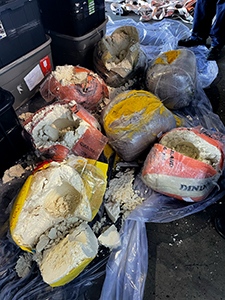STERLING, Va. – U.S. Customs and Border Protection seized about 46 pounds of ketamine, an animal tranquilizer abused by users, in an air cargo shipment from Cameroon on October 10 at Washington Dulles International Airport.
CBP agriculture specialists examined a shipment manifested as “Garri and Water FuFu” that was destined to an address in Washington, D.C. Inside the shipment, agriculture specialists found five packages labeled as Water Fufu, a solid porridge made from puree of cassava or other starchy products, and two packages labeled as Garri, flour produced from cassava root.
CBP agriculture specialists alerted CBP officers that they discovered five bundles containing a crystalized white powder. CBP officers tested the substance with a handheld elemental isotope analysis tool and identified the substance as ketamine hydrochloride.
Ketamine hydrochloride is a Schedule III non-narcotic compound regulated under the Controlled Substances Act.
According to the DEA, ketamine, commonly known on the street as Special K, is used in both human and veterinary medicine to induce sedation, immobility, and relief from pain. It has recently been used by medical professionals for mental health and substance use disorders. Ketamine is abused for its ability to induce dissociative sensations and hallucinations, and it has been used to facilitate sexual assault. Overdoses can lead to nausea, irregular heart rate, muscle stiffening, unconsciousness, and respiratory failure leading to death.
The ketamine weighed 20.87 kilograms, or 45 pounds and 15 ounces, and had a street value of about $1.3 million.
No arrests have been made. An investigation continues.
“Transnational criminal organizations continue to employ a variety of tactics to smuggle illicit narcotics into the United States, and our officers proved once again that they are extraordinarily skilled at detecting these concealment methods,” said Christine Waugh, Acting Area Port Director for CBP’s Area Port of Washington, D.C. “We want to assure the public that Customs and Border Protection remains committed to keeping our country and our communities safe from the scourge of dangerous drugs.”
CBP officers and agents seized an average of 2,895 pounds of dangerous drugs every day at our nation’s air, sea, and land ports of entry. See what else CBP accomplished during "A Typical Day" in 2022.
CBP's border security mission is led at our nation’s Ports of Entry by CBP officers and agriculture specialists from the Office of Field Operations. CBP screens international travelers and cargo and searches for illicit narcotics, unreported currency, weapons, counterfeit consumer goods, prohibited agriculture, invasive weeds and pests, and other illicit products that could potentially harm the American public, U.S. businesses, and our nation’s safety and economic vitality.
Learn more at www.CBP.gov.
Follow the Director of CBP’s Baltimore Field Office on Twitter at @DFOBaltimore for breaking news, current events, human interest stories and photos, and CBP’s Office of Field Operations on Instagram at @cbpfieldops.



